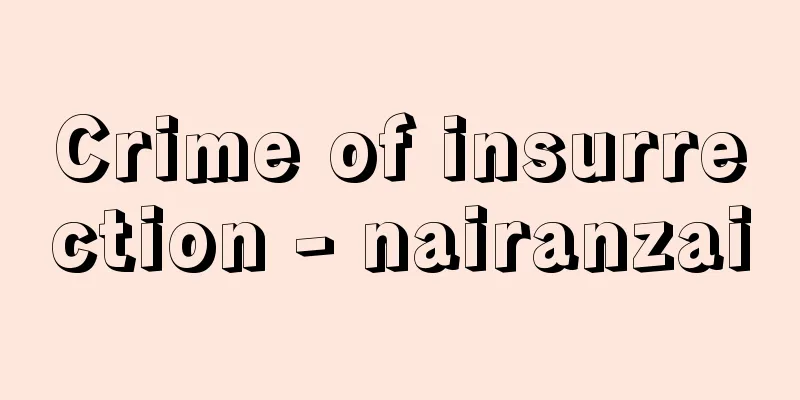Crime of insurrection - nairanzai

|
The crime of violently changing or destroying a nation's basic governing system from within. As this crime, along with the crime of treason, which is the crime of violently changing or destroying a nation from the outside, endangers the very existence of the nation, the perpetrators of this crime are severely punished in any nation. However, if the civil war is successful and a new ruling order is established, the perpetrators cannot be punished under existing criminal law, and may even be praised as heroes of the revolution. For this reason, the crime of civil war is considered a typical example of a political criminal or a crime of conviction, and perpetrators of this crime are generally subject to "honor detention" out of respect for their honor, and the principle of non-extradition of political criminals is also established in international law (Article 2, Paragraph 1 of the Fugitive Offenders Act). Incidentally, "civil war" refers to rioting with the intent of destroying the governing structure of the country, or of exercising power by excluding national sovereignty within the country's territory, or of otherwise disrupting the basic order of governance as established by the Constitution (Article 77, Paragraph 1 of the Penal Code). In addition to the attempted crime, the penal code also broadly punishes the crimes of preparation, conspiracy, and aiding and abetting (Article 77, Paragraph 2, Articles 78, and 79 of the same Code), but if one turns himself in before the riot occurs, he or she will be exempt from punishment (Article 80 of the same Code). In order for the crime of insurrection to be established, a "riot" must be committed with a specified purpose. A "riot" requires that a large number of people join together, commit violence or intimidation, and reach a level that disturbs the peace of a locality. In this way, the crime of insurrection is similar to the crime of riot (Articles 106 and 107 of the Penal Code) in that it is a typical example of a mass or collective crime. The punishment for this crime depends on the type of involvement: ringleaders are sentenced to death or life imprisonment, conspirators and crowd leaders to life imprisonment or imprisonment for three years or more, other personnel to be sentenced to one to ten years imprisonment, and mere accomplices and rioters to imprisonment for three years or less. Trials for political crimes, including the crime of treason, must be public (Article 82, Paragraph 2, of the Constitution). In addition, due to the seriousness of the crime, the first instance trial for this crime falls under the jurisdiction of a high court (Article 16, Paragraph 4, of the Court Act). Incidentally, there were cases before World War II in which people were found guilty of treason, such as the May 15 Incident in May 1932 (Showa 7) and the Shinpeitai Incident in July of the following year, 1933, but as of 2009 (Heisei 21), there have been no cases in the postwar period in which this crime has been applied. [Tetsuro Nawa] [References] | | | | | | |Source: Shogakukan Encyclopedia Nipponica About Encyclopedia Nipponica Information | Legend |
|
国家の基本的な統治機構を国の内部から暴力的に変革・破壊する罪。本罪は、国の外部から暴力的変革・破壊を行う外患罪とともに、国家の存立そのものを危うくする罪であるだけに、いずれの国家においても、その犯人は厳罰に処せられる。ただ、内乱が成功し、新たな支配秩序が確立されれば、既存の刑法では犯人は処罰しえず、むしろ革命の英雄として賞賛されることにもなる。それゆえに、内乱罪は政治犯または確信犯の典型とされ、その犯人に対しては、その名誉を重んじる立場から「名誉拘禁」の対象とされるのが一般的であり、また、国際法上も、政治犯人不引渡しの原則が確立している(逃亡犯罪人引渡法2条1号)。 ところで、「内乱」とは国の統治機構を破壊し、またはその領土において国権を排除して権力を行使し、その他憲法の定める統治の基本秩序を壊乱することを目的として暴動することである(刑法77条1項)。また、本罪の未遂罪のほか、予備・陰謀罪、幇助罪(ほうじょざい)をも広く処罰している(同法77条2項、78条、79条)が、暴動に至る前に自首すれば刑は免除される(同法80条)。 内乱罪が成立するためには、所定の目的で「暴動」をすることを要する。「暴動」は、多数人が結合して、暴行・脅迫を行い、一地方の平穏を害する程度に達することが必要である。このように、内乱罪は多衆犯または集団犯の典型である点で、騒乱罪(刑法106条、107条)と類似する。 本罪の刑罰はこれへの関与の形態に応じて、首謀者は死刑または無期禁錮、謀議参与者・群衆指揮者は無期または3年以上の禁錮、その他の職務従事者は1年以上10年以下の禁錮、単なる付和随行者・暴動参加者は3年以下の禁錮、にそれぞれ処せられる。 内乱罪を含め政治犯罪については、その対審は公開されなければならない(憲法82条2項但書)。また本罪にかかる第一審は、その重大性から高等裁判所が管轄することになっている(裁判所法16条4号)。 なお、内乱罪により有罪とされた事件として、第二次世界大戦前には1932年(昭和7)5月の「五・一五事件」や、翌1933年7月の「神兵隊事件」などがあるが、戦後には本罪が適用された事件は2009年(平成21)現在存在しない。 [名和鐵郎] [参照項目] | | | | | | |出典 小学館 日本大百科全書(ニッポニカ)日本大百科全書(ニッポニカ)について 情報 | 凡例 |
Recommend
Nirvana
A Buddhist term. It refers to the highest state o...
Transformation rule
...A logical formula is a diagrammatic representa...
Mina
A magazine for young women published by Shufunotom...
Thank you
…also called grace. In Greek, charis, in Latin, g...
Lascaris, Constantine
Born: 1434. Constantinople Died: 1501. Messina. Gr...
Levine, P.
...The factor corresponding to this antibody was ...
Maturin
Irish novelist and playwright. Born in Dublin, he ...
bulbous bow
...This is because waves generated from various p...
Tsubaki grasshopper (Tsubaki grasshopper) - Tsubaki grasshopper
A general term for insects of the Orthoptera famil...
Spy - spy (English spelling)
A person who secretly obtains or collects informa...
Shimotsu [town] - Shimotsu
An old town in Kaiso District, northwest of Wakaya...
Hans Ernst Kinck
1865‐1926 A representative novelist of Norwegian n...
Futatsui [town] - Futatsui
A former town in Yamamoto County in northern Akita...
Normandy (English spelling)
Historical region and former province name in nor...
Netherlands Antilles - Netherlands Antilles (English spelling)
A former Dutch self-governing territory in the Les...









